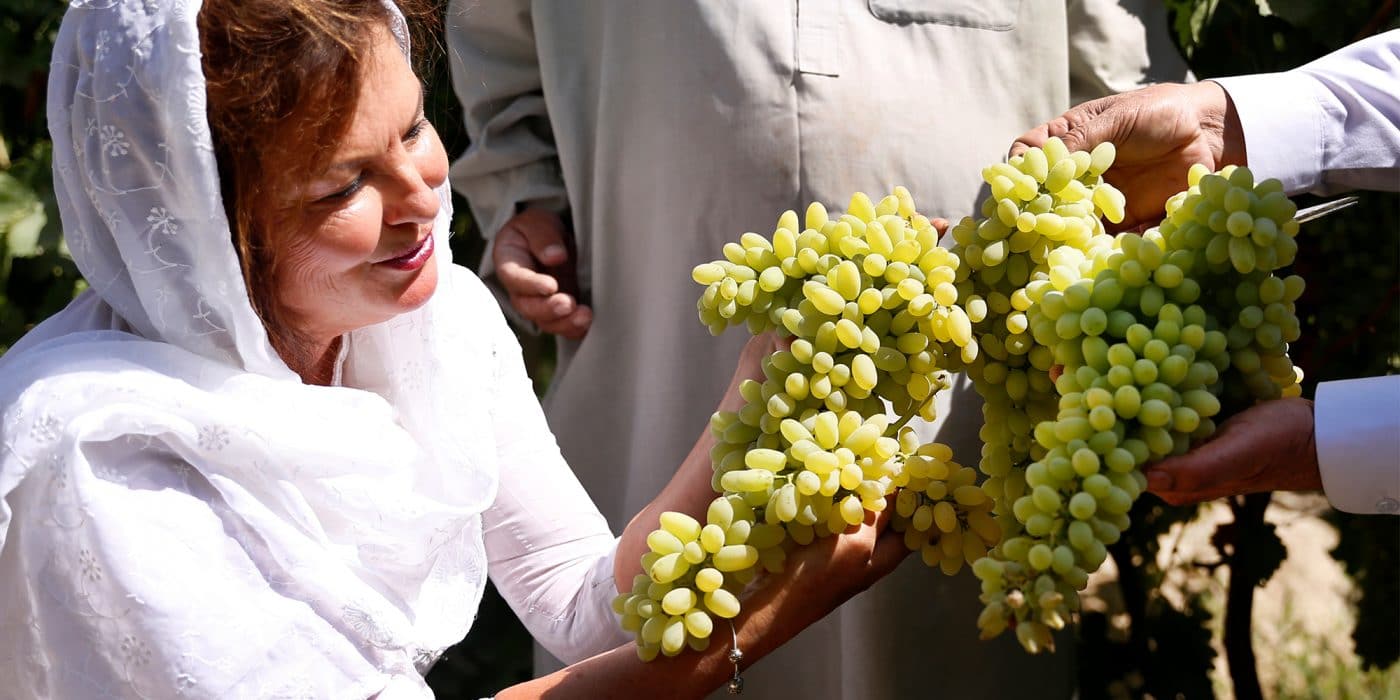Heidi Kuhn, creator of Roots of Peace, is on a quest to eradicate landmines and rebuild post-conflict regions – creating livelihood opportunities worldwide.
Parvati Magazine: Not only do you demine regions to remove threats to life and limb, you also support economic development by cultivating minefields into farmland. What called you to this work?
Heidi Kuhn: In September 1997, following the death of the late Princess Diana, I hosted an event for the Commonwealth Club and [gave] a prophetic toast: “May the world go from mines to vines…”
Turning vision into reality, I turned to the Napa Valley vintners who supported my efforts [as did] many international leaders, including United Nations Secretary General Kofi Annan.
PMAG: What made you choose grapes as the crop to replace mines and as your organization’s logo?
HK: Grapes are sacred in many religions, and represent the seeds we have in common rather than those which separate us. Ancient vines growing on former minefields is a symbol of healing the wounds of war.
PMAG: How have you seen this work transform war-torn regions?
HK: In Afghanistan: In 2003, Diane Disney Miller, daughter of Walt Disney, generously donated the funds to remove landmines in Afghanistan. Roots of Peace partnered with the United Nations Mine Action Service (UNMAS) to remove over 100,000 landmines from the former frontline of the Taliban.
On September 11, 2018, I stood on the Shomali Plains, north of Kabul. It was a profound feeling of peace in the vineyards, as we tasted the juicy nectar of fresh grapes grown on former war-torn lands.
In Israel and Palestine: Roots of Peace was called to Israel by a young boy, Daniel Yuval, age 10, who stepped on a landmine while playing in the snow in the Golan. Together, we helped bring forth unanimous legislation at the Knesset for humanitarian mine action.
Through generous donations from Napa Valley vintners Spiriterra, the fields of Bethlehem were demined by the hands of Israelis and Palestinians […] in a field located only three miles from where Jesus Christ was born, in a Muslim village, governed by Israel. Three faiths came together, so that no other children had to suffer from the perils of war.
In Vietnam: There are over three million landmines, UXO and cluster munition left behind over 40 years after the [Vietnam] war ended. In Quang Tri province, over 80% of the land is still contaminated. In partnership with the Mines Advisory Group (MAG), we have removed thousands of landmines [there], and planted fresh black pepper on former battlefields. Roots of Peace is opening new markets to sell the black pepper to benefit rural farmers.
PMAG: What have you learned about building peace through this work?
HK: Peace is more than a “peace treaty” or “peace talk” or “peace sign”. Peace is digging deep to remove the seeds of hatred, and replace the void with viable seeds of hope.
PMAG: What are some of the challenges you have encountered? How did you handle them to continue moving forward?
HK: On March 28, 2014, our Roots of Peace home in Kabul was attacked by the Taliban in a 4 1/2 hour gun battle. We listened to this horror live from the living room of our home via Skype, as we guided our staff to safety. This was a defining moment, as I pondered whether it was too difficult for a California mother to be working in the dangerous regions of Afghanistan. Yet, after great reflection, I determined that this was not a time in human history to hide under our covers. My spirit was with the brave farmers in the field, who deserved to cultivate a harvest of hope.
PMAG: How has global awareness of the landmine issue, and use of landmines, shifted in the two decades since you began this work?
HK: We live in a world where there are an estimated 70 million landmines in 70 countries. Each day, they maim and kill innocent farmers and children. But interest in this issue has dissipated since [the late Princess Diana’s] tragic death. This is why we need to work harder than ever, so that the scourge of landmines is removed from the face of the Earth [and] the land is fertile for peace to bloom.
PMAG: What keeps you going when you see that landmines are still being built and deployed?
HK: I look into the eyes of my own grandchildren and think of the legacy I want to leave behind for future generations.
Heidi Kuhn, Founder and CEO of Roots of Peace, was deeply inspired in 1997 to create an organization dedicated to the eradication of landmines worldwide following the death of the late Diana, Princess of Wales. Transforming “seeds of terror” into “seeds of hope”, Roots of Peace has replaced thousands landmines with grapevines into sustainable economies around the world.












